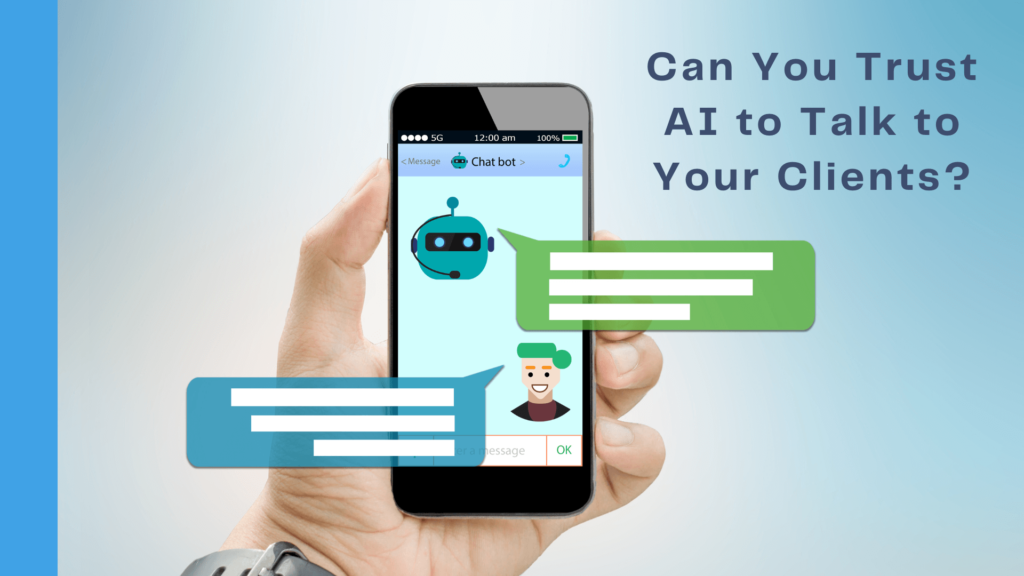In an era marked by technological advancement, the real estate industry is no exception to the integration of artificial intelligence (AI) into its operations. From streamlining processes to enhancing client interactions, AI has become a prominent feature in the toolkit of modern real estate professionals. But amidst the rise of AI-powered communication tools, one question looms large: Can you trust AI to talk to your clients in real estate?

Understanding AI in Real Estate
Before delving into the intricacies of AI’s role in client communication, it’s essential to grasp the broader context of AI adoption within the real estate industry. AI encompasses a wide range of technologies and applications, including machine learning algorithms, natural language processing, and predictive analytics. In real estate, AI is utilized for various purposes, such as property valuation, market analysis, lead generation, and yes, client communication.
Different AI chatbots tailored for real estate for client communication:
- Virtual Assistant: A general-purpose chatbot designed to assist users with various inquiries related to real estate, such as property search, scheduling viewings, answering FAQs about buying or selling, providing neighborhood information, and connecting users with real estate agents.
- Lead Qualification Bot: This chatbot is focused on qualifying leads by asking specific questions to understand users’ preferences, budget, timeline, and other criteria. It can segment leads based on their level of interest and readiness to buy or sell, allowing real estate agents to prioritize follow-up and engagement.
- Property Finder Bot: A specialized chatbot that helps users find properties based on their criteria, such as location, price range, property type, number of bedrooms and bathrooms, amenities, and more. It can provide personalized property recommendations and assist users in scheduling viewings or requesting additional information.
- Mortgage Calculator Bot: This chatbot helps users estimate mortgage payments, affordability, and other financial aspects related to buying a property. It can calculate monthly mortgage payments based on loan amount, interest rate, loan term, and down payment, providing users with valuable insights into their purchasing power.
- Investment Property Bot: Designed for users interested in real estate investment, this chatbot offers guidance on investment property search, analyzing potential returns, rental income projections, property management considerations, and financing options. It assists users in making informed decisions about investment opportunities in real estate.The Rise of AI-Powered Communication
Benefits of AI Communication in Real Estate
The integration of AI-powered communication tools into real estate workflows offers several compelling benefits for professionals in the industry.

An AI chatbot that answers real estate-related questions offers several benefits for both real estate professionals and their clients:
- 24/7 Availability: AI chatbots can provide instant responses to inquiries at any time of the day or night, ensuring round-the-clock availability for users. This allows potential buyers, sellers, or renters to get immediate answers to their questions without having to wait for business hours.
- Scalability: AI chatbots can handle multiple inquiries simultaneously, allowing real estate professionals to scale their operations without increasing their workload proportionally. This scalability is particularly beneficial during peak periods or when dealing with a high volume of inquiries.
- Improved Efficiency: By automating responses to common questions and inquiries, AI chatbots streamline the communication process and reduce the need for manual intervention. This frees up real estate professionals’ time to focus on more complex tasks and personalized interactions with clients.
- Enhanced Customer Service: AI chatbots provide quick, accurate, and consistent responses to users’ questions, leading to improved customer satisfaction. Users appreciate the convenience of instant access to information and assistance, enhancing their overall experience with the real estate brand.
- Lead Generation: AI chatbots can capture leads by engaging users in conversations, qualifying their needs, and collecting contact information for follow-up. By proactively interacting with website visitors, chatbots help identify potential buyers or sellers and initiate the lead nurturing process.
- Cost-Effectiveness: Implementing an AI chatbot for real estate-related inquiries can be cost-effective compared to hiring additional staff or outsourcing customer support. Once deployed, chatbots require minimal maintenance and can handle a large volume of inquiries without incurring additional expenses.
- Data Insights: AI chatbots can gather valuable data and insights from user interactions, such as frequently asked questions, user preferences, and common pain points. Real estate professionals can use this data to refine their marketing strategies, improve their services, and better understand their target audience.
- Personalization: Advanced AI chatbots can analyze user data and tailor responses to individual preferences and needs. By personalizing interactions, chatbots can provide a more engaging and relevant experience for users, increasing the likelihood of converting leads into clients.
Challenges and Concerns
Despite the promising potential of AI communication in real estate, it’s not without its challenges and concerns.

Challenges:
- Accuracy: AI chatbots rely on algorithms to understand and respond to user queries. Ensuring accurate responses can be challenging, especially when faced with complex or ambiguous questions.
- Limited Understanding: Chatbots may struggle to comprehend nuances in language, leading to misinterpretations or irrelevant responses. They may also have difficulty understanding slang, colloquialisms, or regional variations.
- Training Data Bias: AI chatbots learn from historical data, which can introduce biases if the training data is not representative or diverse enough. Biased algorithms may produce unfair or discriminatory outcomes in their interactions with users.
- Technical Limitations: Chatbots may encounter technical limitations such as processing speed, memory constraints, or compatibility issues with different platforms or devices. These limitations can affect the chatbot’s performance and reliability.
- Maintenance and Updates: AI chatbots require ongoing maintenance, updates, and monitoring to ensure optimal performance. This includes refining algorithms, adding new features, addressing bugs or errors, and adapting to changes in user behavior or preferences.
Concerns:
- Privacy and Security: AI chatbots collect and process user data during interactions, raising concerns about privacy and data security. Users may be hesitant to share sensitive information with chatbots, especially if they’re unsure how their data will be used or protected.
- Loss of Human Touch: Some users may prefer human interaction over interactions with chatbots, particularly in sensitive or complex situations. The impersonal nature of chatbots could lead to frustration or dissatisfaction among certain users.
- Ethical Considerations: The use of AI chatbots raises ethical questions regarding transparency, accountability, and fairness. Real estate professionals must ensure that chatbots adhere to ethical guidelines and do not engage in deceptive or manipulative practices.
- Dependency on Technology: Relying too heavily on AI chatbots could lead to over-dependence on technology and a loss of human expertise. Real estate professionals must strike a balance between leveraging technology to enhance efficiency and maintaining personalized, human-centric services.
- User Experience: Poorly designed or implemented chatbots can result in a negative user experience, leading to frustration, confusion, or disengagement. Real estate professionals must prioritize user experience and usability when deploying chatbots to ensure positive interactions with users.
Addressing these challenges and concerns requires careful planning, ongoing monitoring, and continuous improvement of AI chatbot systems. By addressing technical limitations, ensuring data privacy and security, promoting ethical use, and prioritizing user experience, real estate professionals can effectively leverage AI chatbots to enhance their services and engage with clients and prospects.
Ensuring Data Privacy and Security
Another critical consideration when using AI in client communication is the protection of sensitive information and compliance with data privacy regulations. Real estate transactions involve the exchange of highly confidential data, including personal financial information and property details. Therefore, it’s essential to ensure that AI communication tools adhere to stringent data security protocols and encryption standards to safeguard client information against unauthorized access or breaches.
Building Trust with Clients
Trust is the cornerstone of successful client relationships in the real estate industry. Real estate professionals must consider how AI communication impacts client trust and take proactive measures to build and maintain trust throughout the client journey. Transparency is key—clients should be informed when they’re interacting with an AI chatbot rather than a human agent, setting clear expectations and avoiding misrepresentation. Additionally, providing opportunities for clients to escalate inquiries to human agents when necessary demonstrates a commitment to client satisfaction and reinforces trust in the agent-client relationship.
Best Practices for Using AI in Client Communication
To effectively leverage AI in client communication while addressing concerns and maintaining trust, real estate professionals can follow certain best practices:

- Invest in AI chatbot training: Ensure that AI chatbots are equipped with comprehensive training data and continually refined to improve accuracy and effectiveness in responding to client inquiries.
- Monitor and evaluate performance: Regularly monitor AI chatbot interactions and gather feedback from clients to identify areas for improvement and optimization.
- Offer seamless handoffs to human agents: Implement a smooth transition process for escalating inquiries from AI chatbots to human agents when necessary, ensuring continuity and quality in client communication.
- Prioritize data security and privacy: Implement robust data security measures and compliance protocols to protect client information and mitigate the risk of data breaches or unauthorized access.
Conclusion
While AI communication presents both opportunities and challenges in the real estate business, its role in client interactions is likely to continue evolving as technology advances and industry practices adapt. By understanding the benefits, challenges, and best practices associated with AI-powered communication tools, real estate professionals can harness the full potential of AI to enhance client experiences and drive business growth while maintaining trust and authenticity in client relationships.
In conclusion, the question remains: Can you trust AI to talk to your clients in real estate? With careful consideration, strategic implementation, and a commitment to maintaining human-centric values, the answer is a resounding yes.






